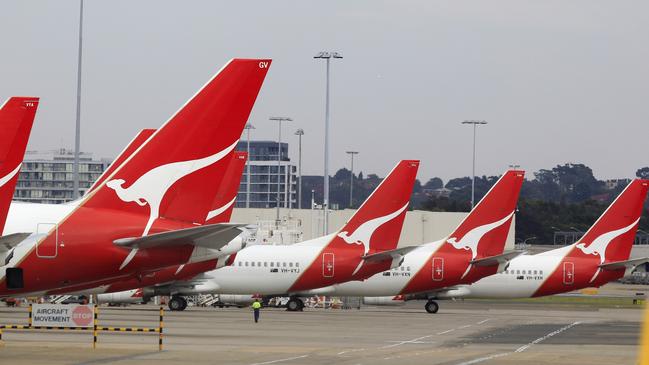Qantas share sale to super fund ‘not dishonest’, NSW Supreme Court declares
A court has found Qantas did not act dishonestly by transferring millions of shares to its own employee super fund over almost 30 years.
Business
Don't miss out on the headlines from Business. Followed categories will be added to My News.
A Supreme Court judge has found Qantas did not act dishonestly in the course of hundreds of share transactions with its own employee super fund over the last three decades.
The Corporations Act does not allow the issue or transfer of shares by a company to an entity it controls unless exempted by the Australian Securities & Investments Commission.
Justice Scott Nixon heard Qantas was unaware the share trades were being made by third party investment managers employed by Qantas Super, a fund established for the benefit of eligible Australian-based employees of the airline.
It took a question to the Qantas AGM in 2022 about the proxy voting power of members of Qantas Super, for the company to realise it may be in breach of the Act.
Advice was sought from law firm King and Wood Mallesons which advised that the shares traded to Qantas Super may be “void” unless ASIC had granted an exemption.
Barrister Imtiaz Ahmed SC said Qantas sought orders under section 1322 of the Corporations Act, which essentially allowed companies to rectify “honest” procedural mistakes made in the course of their business.
“On becoming aware of these matters, Qantas implemented a number of interim measures,” Mr Ahmed said.
“Qantas Super took steps to ensure that it abstained from resolutions relating to Qantas and took steps to cease trading in Qantas shares.”
On June 17, ASIC granted Qantas Super’s exemption on the condition the fund’s holding of voting shares in Qantas did not exceed 5 per cent of the total number of shares.
The court heard Qantas Super currently held 692,294 voting shares in Qantas, representing 0.04 per cent of the total Qantas shares on issue.

Given ASIC’s exemption was not retrospective, Qantas Super was required to validate at least 482 historic share transactions in the Supreme Court.
Mr Ahmed said there may have been more transactions, but they could not be identified through the information available, given they dated back to July 1995.
“And it is not possible to identify the details of sales or transfers to third parties for all transactions during the period,” Mr Ahmed told the court.
“Further, it’s not possible to ascertain details of subsequent trades in the period — some of the shares may have traded many times over.”
Justice Nixon agreed to make the orders requested by Qantas under section 1322 saying there was “no evidence of any dishonesty on the part of Qantas Super or Qantas in connection with the relevant transactions”.
“Instead, the present situation appears to have come about as the result of an oversight, in circumstances where the acquisitions in question were made by investment managers,” Justice Nixon said.
“When the issue came to light it was promptly reported, investigated and addressed. In particular, Qantas has obtained the ASIC exemption and have put in place processes to ensure the undertakings given to ASIX were complied with.”
He also noted neither ASIC nor the Australian Prudential Regulatory Authority had seen the need to appear at the hearing.
“I’m satisfied that it’s just and equitable that an order be made under section 1322 validating the relevant transaction and no substantial injustice has been or is likely to be caused to any person,” Justice Nixon said.
As of June 30, Qantas Super had 26,063 members and 71,375 former members and controlled funds of about $9bn, of which Qantas shares amounted to $4m.
Originally published as Qantas share sale to super fund ‘not dishonest’, NSW Supreme Court declares




